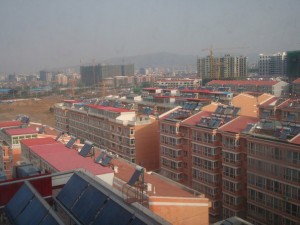Dickinson to Durban » Environmental Politics » Paying off the debt
Paying off the debt
Human growth and expansion is responsible for a majority of climate change. Historically, the blame has fallen upon developed nations, most notably the United States, however, rapidly expanding economies in developing countries, especially the BRICS nations (Brazil, Russia, India, China, and South Africa), are now contributing a substantial amount of greenhouse gases exacerbating global climate change. A significant part of the problem lies in the practice of outsourcing the most polluting industrial processes to these countries.
Developing countries profit from the outsourcing and have experienced incredible growth rates which would have otherwise been impossible. This growth, however, has not been coupled with a rising level of sustainability efforts and many industries remain grossly inefficient. Because so many goods are manufactured in developing countries that consume these massive amounts of energy, which is also very expensive, it makes economic sense for countries such as the United States and other developed nations to subsidize improvements in efficiency.
Geography also plays a major role in the production of green house gases. because

Many Chinese cities have adopted the use of solar hot water heating panels to help reduce energy costs. Photo by author
countries in higher latitudes experience colder weather, a large expenditure of energy is made to keep warm. For many areas this involves the direct burning of coal and the polluting of surrounding areas. In several areas, climate change is not the only concern. pollution and smog levels can be toxic due to emissions for heating, especially when coupled with emissions released during manufacturing. Smog levels were so bad, in fact, that during the 2008 Olympics in Beijing, several hundred businesses were forced to cease production across China for weeks before the Opening Ceremony. Because of high energy demands upon urban areas in developing countries and the expense which they incur, energy efficient products are readily consumed. The World Bank estimates that should several of the top developing nations remove tariffs for energy saving products, trade could rise up to 13% making it a smart economic decision.
The responsibility of preventing dangerous levels of climate change falls upon developed nations that wish to continue long term improvements in their economy, which should be all of them. Roberts and Parks in their book A Climate of Injustice discuss the concept of ecological debt. Ecological debt is the notion that wealthy, developed nations have acquired a substantial debt from their exploitations of raw materials in poor countries. After underpaying for centuries and leaving many countries’ natural resources severely degraded, profiting nations have the responsibility to pay off that debt by helping nations develop, preferably in an efficient and sustainable fashion. By supporting the developing nations as well as adjusting environmental practices within their own countries, developed nations will be able to carry the load to combat global climate change and pay off their debt.
Works Cited
Roberts & Parks, 2007. “Fueling Injustice: Emissions, Development Paths, and Responsibility.” In Roberts & Parks, A Climate of Injustice, MIT Press, Cambridge, MA, pp. 133-184.
Bulkeley, H., and P. Newell, 2010. Governing Climate Change. Routledge, New York.
Yardley, Jim, 2007. “Cities Near Beijing Close Factories to Improve Air for Olympics.” The New York Times, July 7, 2011. Accessed September 12, 2011. http://www.nytimes.com/2008/07/07/sports/olympics/07china.html
Filed under: Environmental Politics









Recent Comments